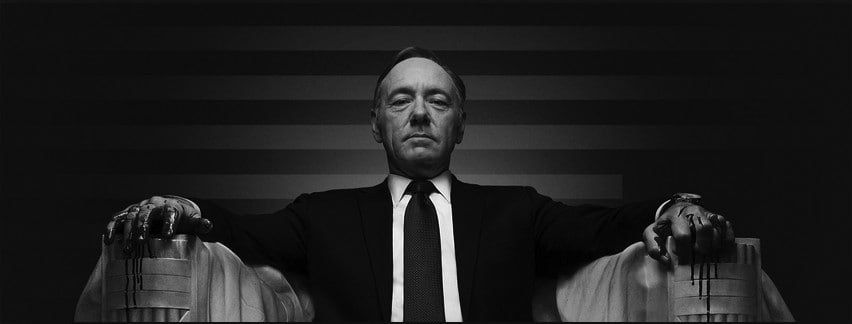By Kristóf Oltvai
News Editor Emeritus
In the penultimate episode of the new House of Cards season, Claire Underwood slips up. “I’m starting to question all of it, Francis,” she says, addressing Kevin Spacey’s antiheroic headliner. “What any of it is worth. What are we doing this for?”
Her question comes five episodes too late—indeed, it’s a question that began to haunt me less than halfway into the season. Monotone performances and unrealistic plotlines, two things House of Cards now brings aplenty, are both easily supplanted by one simple fact: the central narrative tension of the show is gone, replaced by empty threats, melodrama, and an appalling lack of emotional finesse.
Frank Underwood’s goal was always revenge on a president who slighted him. In the first season, it was satisfying, sometimes even thrilling, to watch Frank and his equally Machiavellian wife Claire claw their way to the top of the bloody D.C. totem pole. In his addresses to the camera, the viewer schemed with Frank as he pushed people under the subway—literally and figuratively—on his road to the White House.
Now they’ve made it: Frank lords over the Oval Office, swigging whiskey with high-ups, while Claire sways in ballroom gowns and flirts with foreign heads of state. Yes, they still seem to “want” things—Frank fights for reelection as Claire makes Hillary-esque steps to her own career—but these newfound motives have emerged out of thin air.
Frank makes big talk about “legacy,” but it’s unclear why a person like him would care about the American public. The same thing goes for Claire’s sudden interest in international diplomacy.
The Underwoods were never out to make the world a better place. To make it seem like they somehow are now is profoundly out-of-character. It not only jars the viewer, it bores her.
Sure, there are still subplots—most of them unrealistic. Some things are just inconceivable in American politics, such as a sitting president announcing the end of all entitlements in a nationwide address, or a first lady calling the Russian government “ignorant” in the Kremlin’s press room.
But the unbelievability stretches beyond the executive, and the screenplay bombs as it ventures into uncharted waters like theology or constitutional law.
In one scene of a Supreme Court hearing, Frank’s Attorney General makes appeals to contemporary politics any bench would find vulgar and irrelevant. When Frank meets with the bishop of Washington in a later episode, the spiritual hokey exchanged between them—though obviously meant to be “deep”—is banal to anyone who’s thought more than 20 minutes about Christianity.
The dialogue has generally taken on a deflated air, as if crushed by the weight of the Underwood presidency itself. Even pillow talk is delivered with the preparedness of a stateroom address and everyone, from Chief of Staff Remy to minor bureau thugs, intones a heaviness and arrogance usually reserved for college interviews.
A few characters, Doug Stamper and Viktor Petrov, an all-too-familiar Russian president, manage to sound and act like real people, but most in this once-colorful cast have been reduced to shadows of their former selves: grey, stone-faced, as if afraid a summer intern might catch them in an unguarded moment of actual emotion.
That’s not to say there aren’t good moments—there are, and they come far too late. But the sad thing is that even Frank and Claire, once so edgy in their scheming amorality, most often act like just two more talking heads in a sea of babblers. They’re still eager to one-up their conversation partners or make an occasional grandiose gesture, but it’s without any real motive or reason.
So when the melodrama comes, as it does in bits and pieces, it seems disingenuous and overwrought. House of Cards has jumped the shark. Its era is over.
Photo Courtesy of http://www.ign.com/articles/2014/02/16/house-of-cards-season-2-review

